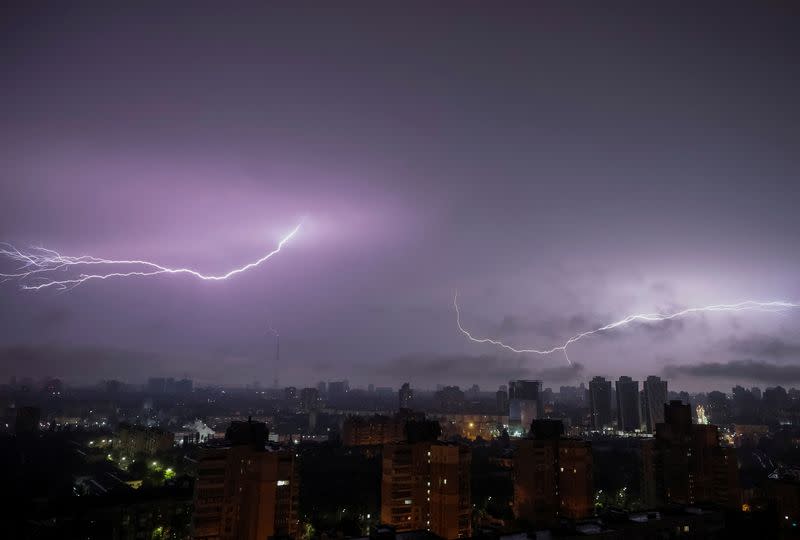Ukraine's international bond rework derailed as deadline nears

By Karin Strohecker and Libby George
LONDON (Reuters) -Ukraine has not been able to reach an agreement with a group of bondholders over restructuring some $20 billion of international debt during formal talks, it said on Monday, raising the spectre that the war-torn country might slip into default.
An agreement with holders of international bonds that allowed Ukraine to suspend payments after Russia's invasion of the country in 2022 ends in August.
Ukraine's Finance Minister Serhiy Marchenko said talks would continue and he expected the government to reach an agreement by Aug. 1.
The country's dollar-denominated eurobonds fell by more than 2.0 cents with near-term maturities trading at deeply distressed levels between 26-30 cents on the dollar.
Formal talks with the ad-hoc bondholder committee had been underway for nearly two weeks, as Ukraine seeks to rework its debt in order to retain access to international markets while meeting International Monetary Fund (IMF) demands to restructure.
However, the government's proposal and a counter proposal by bondholders showed how far apart the parties are and the uphill struggle Ukraine will face to get the debt restructuring over the line in the coming weeks.
"Although Ukraine and the Ad Hoc Creditor Committee did not come to an agreement on restructuring terms during the consultation period, (they) will continue engagement and constructive discussions through their respective advisors," the government said in a statement. It added the ad-hoc group controlled roughly 20% of outstanding bonds and authorities would also continue bilateral discussions with other investors.
Finance Minister Marchenko said the country's economy was a "fragile balance" that hinged on consistent and substantial support from its partners.
"Timely debt restructuring is a critical part of this support," he said. "Strong armies must be underpinned by strong economies to win wars."
Bondholders said the government's proposal had demanded a writedown that was "significantly in excess" of the 20% expected by markets.
The proposal would "risk substantial damage to Ukraine's future investor base and core objective of re-accessing capital markets at the earliest opportunity", they added.
Analysts at JPMorgan had estimated a "haircut", or writedown, of 30% on the outstanding bonds as well as past due interest along with coupon relief would allow Ukraine to hit its IMF targets.
Ukraine could seek to extend the payment suspension beyond August, but prefers the more lasting solution of a full debt rework.
Ukraine in reality already does not have access to international capital markets, but going into default could complicate potential funding avenues, including some multilateral and commercial lending.
Sources have also stressed that Ukraine is keen to avoid investors selling off its bonds to hedge funds and others less amenable to cooperative debt rework deals.
A default now would be Ukraine's second in a decade prompted by a Russian invasion - a symbolic setback the country wants to avoid. The first was after Moscow annexed Crimea in 2014.
THE PROPOSAL
Undertaking a debt restructuring in the middle of a raging conflict that makes its economic and fiscal situation highly uncertain was always seen as an unprecedented and monumental task for Ukraine.
The IMF is also due to release its next review of Ukraine's financial state within weeks - key figures that determine how much debt relief it thinks the country needs.
Kyiv's bilateral allies, which are ploughing billions into the country to shore up its war effort and economy, are reluctant to see Ukraine funnelling money to debt payments.
The Group of Seven rich democracies agreed on Thursday to use proceeds from frozen Russian assets to give Ukraine $50 billion in loans. Since the start of the war, international partners such as the World Bank and IMF have also provided more than $85 billion in state budget financing to Kyiv.
Ukraine offered to swap bondholders' existing debt for five sovereign bonds maturing between 2034 and 2040, as well as a so-called state-contingent debt instrument (SCDI) linked to tax revenue performance, Monday's statement showed. The value of that instrument would be determined in 2027 when it transforms into a bond coinciding with the expiration of the country's current IMF programme.
Investors had asked for instruments that would generate a steady cashflow from the outset and the new bonds would have paid interest at a symbolic amount of 1% for the first 18 months, rising to 3% for 2026 and 2027 and then 6%, for a total coupon payment of $700 million over the course of the IMF programme.
The offer translated into a haircut of between 25% and 60%, depending on the performance of the SCDI. Ukraine also offered investors an option including only conventional bonds.
Bondholders put forward two counter proposals, both of which would have carried a nominal haircut of 20%, according to the government statement, and allowed for the potential full recovery of the concessions.
The government said neither bondholder proposal met IMF requirements.
The two proposals consisted of a package of two types of instruments - a series of two bonds paying a coupon in excess of 7% as well as a "recovery bond" that featured variable, step-up payments.
Ukraine also proposed removing a cross default clause between its international bonds and its GDP warrants, which are linked to economic growth and on which it owes investors $2.6 billion.
(Reporting by Karin Strohecker and Libby George, additional reporting by Marc Jones; editing by Dhara Ranasinghe, Kirsten Donovan and Deepa Babington)

 Yahoo Finance
Yahoo Finance 